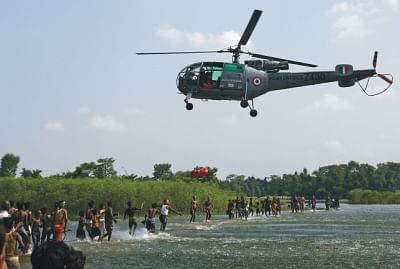India focuses on care for flood victims

Indian flood-affected villagers run to collect relief material dropped by a relief helicopter of the Indian Air Force in Madhepura district in India's northeastern state of Bihar yesterday. India was grappling with the task of feeding and housing close to a million villagers displaced by huge floods in the eastern state of Bihar as the rescue effort wound down. Photo: AFP
India was grappling on Sunday with the task of feeding and housing close to a million villagers displaced by huge floods in the eastern state of Bihar, as the rescue effort wound down.
Some 900,000 people fled from their homes or were evacuated by boat since the Kosi river breached its defences three weeks ago on the Nepal border and changed course.
Bihar officials have turned every available building -- schools, temples, student housing -- into temporary shelters.
But as destitute villagers squatted on roads after getting off rescue boats and mothers held babies ill from drinking muddy flood waters, survivors and charities said far more aid would be needed.
"Private people are helping us, but the government is not helping us," said Mithilesh Yadav, 30, who left his village on a rescue boat with his wife and five children Wednesday.
"The schools, the camps, everything is full. We have put up these huts ourselves. We have to live somehow."
Up to five million people have been affected in India and another 60,000 in Nepal, aid agencies say, underlining the scale of the task facing authorities and charities.
In relief camps in Nepal at least 14 people have died from disease, the top official of the border district of Sunsari told AFP on Sunday.
The Indian media has been critical of aid efforts by the government and international agencies.
One national daily, the Hindustan Times, ran a photograph of children with their hands outstretched for food with the headline, "India's Shame."
Aid agencies said they and authorities were doing everything they possibly could, but admitted there were still many awaiting food, shelter and health supplies.
"The government machinery and everyone have been moving around the clock," said Aditi Kapur, a spokeswoman for British aid group Oxfam, which has workers in the badly affected Supaul area.
"At the same time, there are still people in remote areas who are waiting for relief. Shelters are cramped and unhygienic. There are pregnant and lactating women who need safe drinking water. These things are not there."
The top administrative officials in three of the five Indian districts flooded by the river have been replaced in the past two weeks amid allegations of mismanaging relief efforts, the Press Trust of India news agency has reported.
With India and Nepal still trading accusations on who was to blame for the failure of the flood walls, it was unclear when work on repairing the breach would start, and how long it would take to complete.
The delays have meant that India must ready to provide for at least a million people for several months.
"This is really only the beginning," said Malini Morzaria, a European Commission humanitarian aid representative who visited the area last week, adding that the body has pledged two million euros (three million dollars) to the aid effort.
"There is still much work to be done in reaching the most vulnerable," she said.

 For all latest news, follow The Daily Star's Google News channel.
For all latest news, follow The Daily Star's Google News channel. 



Comments